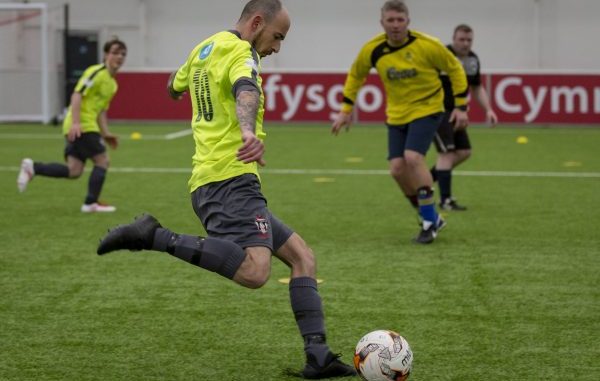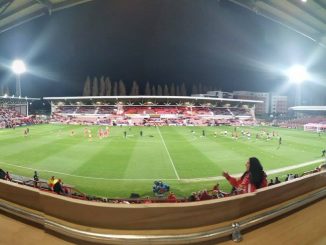
By Ethan Harris
A FOOTBALL manager has beaten alcohol dependence and is helping to change the lives of others thanks to his side, Wrexham Inclusion FC.
Once drinking up to two litres of vodka a night, Wayne Greenshields is now in charge of a side that looks to help all of those in its ranks better their lives and give them the support they need.
Greenshields had issues with alcoholism before joining a drug and alcohol football programme in Wrexham. It helped him onto the path that now sees him provide for others at his own club at Wrexham Inclusion FC.
Great day at @Time2TalkFooty tournament today which seen us pick up the Europa league title. Massive thank you to the organisers for the welcome and a brilliant tournament! #wwtss pic.twitter.com/MI3ZMZgDRT
— Wrexham Inclusion FC (@WrexhamIFC) February 17, 2019
The club was founded in 2011, with Greenshields joining as manager in 2015, providing the chances for ordinary people to take part in over 20 tournaments a year.
“Originally, back in the day, I was an alcoholic. As a single dad of two boys who were both very young, I was in university and I was working,” said Greenshields.
“The world thought ‘Wayne Greenshields is astonishing, volunteering in the community’, but behind closed doors my life was in tatters.
“I was drinking on average, two litres of vodka a night, taking vodka to university or to work with me and the only person who ever truly knew was my mum. She used to come in and do my cleaning for me, and she’d find bottles here, there and everywhere.”
After joining a programme that helped him become sober, Greenshields joined forces with Wrexham Inclusion FC and helped create an environment where people could get help with all parts of their lives.
Helping those with disabilities, mental health problems and homelessness find a place to get support alongside the chance to play football, the club receives no funding and travels across Europe to take part in football events.
“Our training sessions see between 70-90 players every week, ranging from mental health to disability social inclusion, homelessness, you name it we support it, but the main work we do is obviously football,” he continued.
“We take the lads to tournaments, but it’s the off the field activities that are the important stuff.
“It’s the peer mentoring, CV building, one-to-one work, anger management programmes that we can work with people. It’s the volunteering and interview techniques they’re all things that can help people get further in their lives.
“It’s up to each individual that joins us what they get out of their journey; we’re just there to support it really.”
Their most recent endeavour saw them take a ‘Europa League trophy’ in Treforest at a ‘Time2Talk’ tournament focusing on ending the stigma surrounding mental health.
Wrexham Yellows v Newtown @WrexhamIFC v @NewtownAFC #USWTIME2TALK pic.twitter.com/E3Ds4TsqKD
— USW_Time2Talk 🏴 (@Time2TalkFooty) February 17, 2019
The event was a seven team tournament run by students and held at the USW Sport Park.
Greenshields stressed the importance of hosting these kinds of events.
“The more tournaments that mental health football clubs can advertise and attend, the more chance you have of attaining and retaining numbers,” he remarked.
“At Wrexham Inclusion, we have healthy numbers and I think a lot of that stems from being the most travelled club in the UK.
“We travel every two weeks to a tournament, as well as travelling parts of Europe, and it gives the players that feeling of ‘Wow, I’m almost a footballer’.
“In May this year, we’re travelling down to Portsmouth to play at Fratton Park. We’ve played at Brighton’s £25.2 million training ground.
“When they’re getting chances to play in beautiful arenas like this, on the day it can help them. It gives them a target to aim for, something to be good for, something to work for.”
With football as a medium to provide for those in need of support, the club also helps to promote men talking about their problems through the sport.
Alongside an aim to quash the stigma surrounding toxic masculinity, football at Wrexham Inclusion FC allows a safe space for anyone with issues to get the help they need.
“As we’re discussing stigma, men and talking have always been two opposing things,” said Greenshields.
“Football is an international language, you don’t need to speak another language because your feet, hands and the ball does all the talking for you.
“You can teach winning, losing, togetherness, passion, developing, how to react in situations, how not to, managing your behaviour or a team, even looking after your friends and all those things are possible through the vehicle of football.”
The journey is far from slowing down for the north Wales team, with trips to Belfast, Portsmouth and Newport all lined up for the near future.
“We’re very busy at the moment. We’re travelling to Leek in two weeks to play 11-a-side against their disability team,” Greenshields said.
“We have a two-day trip to Portsmouth in May, the ‘We Wear the Same Shirt’ tournament in Dragons Park as well, and then the big icing on the cake will probably come at the George Best Disability Cup in June.
“We’ll see 72 teams from around the UK, taking part in the biggest disability tournament in the world.
“I’m not sure we’re going to see the success that we had in the tournament last year, where we had a Wrexham v Wrexham final, but it’ll be great all the same.”



